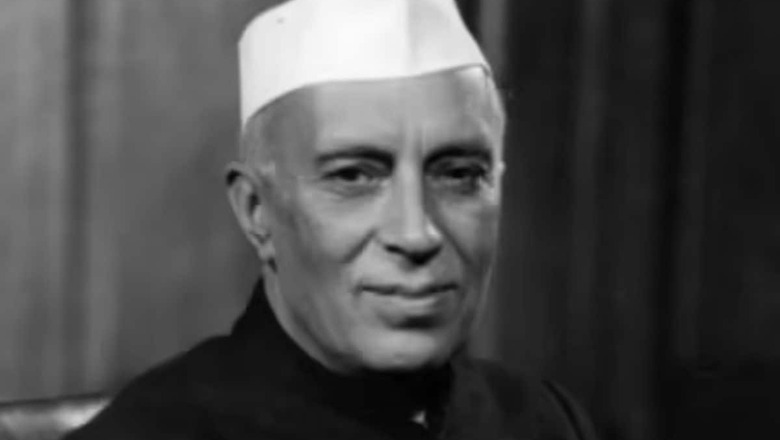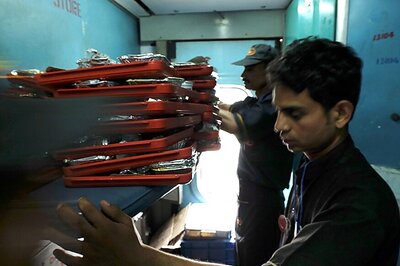
views
While India’s Constitution-makers borrowed many provisions from the Government of India Act, 1935, somewhat puzzlingly they decided to differ on one key aspect. The Constitution of India, when promulgated on January 26, 1950, did not have the 1935 Act’s provision for reservation of seats for women.
The issue of women’s representation in the country’s legislatures never emerged as a matter of significance in the Constituent Assembly, which otherwise debated threadbare the smallest of the constitutional issues. The members of the Constituent Assembly who discussed the issue were either over-optimistic about women’s presence in the law-making chambers, to the extent of being cut off from ground reality, or were unwilling to take the issue in all its seriousness.
The most striking feature of the absence of reserved seats for women was that the opposition to such a provision came from the women members of the Constituent Assembly.
On December 19, 1946, at the very initial stages of the debates, feminist and social activist Hansa Mehta spoke against the reservation of seats for women. Instead, she argued for social, economic, and political justice for women. “Women form one half of the population of this country and, therefore, men cannot go very far without the co-operation of women,” Mehta warned.
Mehta’s husband Jivraj Mehta, who was Gandhi’s personal physician for some time, would go on to become the newly formed Gujarat’s first chief minister in 1960.
Speaking on July 18, 1947, Renuka Ray was more forthright. “We are particularly opposed to the reservation of seats for women,” she declared, adding, “Ever since the start of the women’s movement in this country, women have been fundamentally opposed to special privileges and reservations.” Ray told the Assembly that the Government of India Act, 1935, had provided for reserved seats for women despite objections raised by the representatives of the All India Women’s Conference (AIWC). The three representatives of the AIWC had made it clear to the British Joint Parliamentary Committee, based on whose report the law was framed, that Indian women “were against the reservation of seats or any special privileges for women”. Now, “Indian women will not tolerate any such reservations in the Constitution”, Ray thundered.
Sarojini Naidu also declared, “I think that the time has come in the onward march of the world-civilisation when there should be no longer any sex consciousness or sex separation in the service of the country.”
A differing voice was heard on a related matter in October 1949, when the Constituent Assembly was just over a month away from closing the debates on the Draft Constitution and adopting the final version. The matter came up in relation to replacing the members of the Assembly who were vacating their seats, as those who were members of both provincial legislatures and the Constituent Assembly had to choose any one.
When BR Ambedkar proposed that any seat vacated by a Sikh, Muslim, or a Scheduled Caste member should be filled up by a member of the same community, Purnima Banerji suggeted that the same rule should apply to seats vacated by women too. She noted with much chagrin that the three seats vacated by Sarojini Naidu (who had passed away), Vijayalakshmi Pandit, and Malati Chaudhuri were filled up by men.
Banerji, who was hesitant to raise her demand to start with, fearing ridicule from those who opposed the reservation of seats for women, withdrew soon.
The big question is: what was the thought process behind the vocal women members refusing reservation? Renuka Ray held up the example of Vijayalakshmi Pandit, India’s ambassador to the Soviet Union. “No reservation of seats was required to induce the men who are today in power to select a woman as Ambassador,” Ray argued.
She thought that the provision for reservation of seats for women in the Government of India Act, 1935, had caused dissension amongst political workers and had “divided the country”. She believed that reserving seats for women would create a hurdle for considering even competent women for general seats. Her hope was that not only women with exceptional abilities but also those women who were “equally able as men” would be considered for being chosen as representatives in the legislatures, irrespective of their gender.
It is not the case that these members were not conscious of the fact that Sarojini Naidu and Vijayalakshmi Pandit were not appropriate benchmarks when considering the empowerment of the ordinary women of the country. For instance, Hansa Mehta admitted in her speech: “It is true that a few women in the past and even today enjoy high status and have received the highest honour that any man can receive, like our friend, Mrs Sarojini Nadu. But these women are few and far between. One swallow does not make a summer. These women do not give us a real picture of the position of Indian women in this country. The average woman in this country has suffered now for centuries from inequalities heaped upon her by laws, customs and practices of people who have fallen from the heights of that civilisation of which we are all so proud… There are thousands of women today who are denied the ordinary human rights. They are put behind the purdah, secluded within the four walls of their homes, unable to move freely. The Indian woman has been reduced to such a state of helplessness that she has become an easy prey of those who wish to exploit the situation.”
Even this acute consciousness somehow appears to have been dulled by a strange dose of Gandhian utopia, leading to pious hopes completely divorced from that very consciousness. A sudden surge of gratitude for men took over, as if blinding the women members from India’s societal reality. Renuka Ray told the Constituent Assembly: “When Mahatma Gandhi gave his call so specifically to the women of this country to take part in the national movement, all the social barriers of centuries broke down. There are no words to convey the gratitude of the women of this country to this Great man… Sir, it is not only the inherent qualities of women but more particularly I should say the qualities of our men that is responsible for the fact that in our country, there has never been any strife between men and women.”
There were members like Naziruddin Ahmad and KT Shah, who opposed the use of the phrase “men and women” instead of “citizens”. Shah alleged that such usage smacked too much “of patronising by men over women”. While members like Jaipal Singh put forth categorical statements such as “There are too many men in the Constituent Assembly. We want more women, more women of the type of Mrs Vijayalakshmi Pandit,” there were other members whose comments were borderline misogynistic. Rohini Kumar Chaudhari argued in favour of separate women’s constituencies, and his reasons were nothing short of spectacular: “If you give them a special constituency, they can have their scramble and fight there among themselves without coming into the general constituency. Otherwise, we may at times feel weak and yield in their favour and give them seats which they are not entitled to.”
“The strategy which they have played by the non-reservation of special seats in the future legislature only goes to prove that they will get more seats when they do not ask for it,” Chaudhuri continued, because in his experience, he claimed, “If a woman does not ask for anything you give her more. If she asks, you may sometimes refuse.”
Chaudhuri went as far as hinting that when there were more women members in Parliament, there would be more “loose talk”.
G Durgabai, a member of the Constituent Assembly’s Steering Committee, also raised serious accusations against some members for remarking that “a lady has been put up to defend the action of the Drafting Committee”. An angry Durgabai told the Assembly: “I am very sorry to find some of the honourable Members of the House — male Members — still conscious of this sex business though the women Members have completely forgotten it.”
If Gandhi was being invoked by the women members to refuse reservation of seats, the male members not kindly disposed towards the concept of equality of men and women were also talking of Gandhi. Lokanath Mishra, for example, shared his fears with the Assembly by warning: “If unfortunately, on the emergence of the new woman, women claim freedom and equality in all respects with men and thereby become competitors and rivals to men, I am sure there will be an end to our civilization on which we have been living all these years.”
Reminding the members of the Assembly of Gandhi’s words to the effect that India has a mission, he hinted that the inclusion of fundamental rights of equality of sex and liberty acted against that Gandhian idea. His suggestion, therefore, was to call the Indian Constitution “an Anglo-American Constitution Act for India”.
Surprisingly, these incidents were apparently not enough to clear the mist of false hopes from the minds of the Constitution-makers.
On the last day of 1949, Prime Minister Jawaharlal Nehru wrote to the premiers of the provinces that for the upcoming elections to fill the vacant seats in the provisional parliament, they should encourage the nomination of “suitable men”, especially from the Scheduled Castes as they were not adequately represented in Parliament. Perhaps on second thought he wrote to the premiers again just four days later “about the necessity of having an adequate number of women members elected”. The provincial Congress Committees were, however, not paying much importance to that advice. In the middle of January, Nehru wrote to Rajkumari Amrit Kaur, “I am afraid I can do nothing more at this stage.”
That the ship had sailed, and that the Prime Minister was not going to stir the hornet’s nest over it was clear from Nehru’s speech in the provisional parliament on February 3, 1950, where he designated the low representation of women as a “relatively small matter”. He stated clearly the problem of inadequate representation of women “is not a matter which concerns Government policy, or on which we can say much, except that I would like to express my entire concurrence with that complaint and my firm opinion that women have not had a fair deal in this country”.
In other words, Nehru believed that women should have had greater representation in the legislature, but his government was not ready to translate the idea into reality. It was probably this thought process that prevented the issue of reservation of seats for women from being seriously debated in the Constituent Assembly.
Chandrachur Ghose is author of the national bestsellers ‘1947-57, India: The Birth of a Republic’ (2023) and ‘Bose: The Untold Story of an Inconvenient Nationalist’ (2022), both published by Penguin. Views expressed in the above piece are personal and solely those of the author. They do not necessarily reflect News18’s views.




















Comments
0 comment